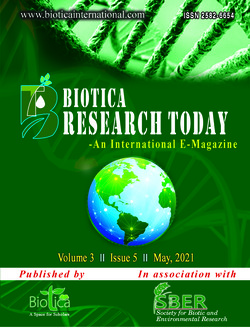
Seaweed Toxicological Effects: Awareness of Protections for Human Consumption
Ambika Binesh*
Dept. of Basic Sciences (Biotechnology), Institute of Fisheries Post Graduate Studies, Tamil Nadu Dr. J. Jayalalithaa Fisheries University, OMR Campus, Vaniyanchavadi, Chennai, Tamil Nadu (603 103), India
Kaliyamurthi Venkatachalam
Dept. of Basic Sciences (Biochemistry), Institute of Fisheries Post Graduate Studies, Tamil Nadu Dr. J. Jayalalithaa Fisheries University, OMR Campus, Vaniyanchavadi, Chennai, Tamil Nadu (603 103), India
DOI: NIL
Keywords: Active compounds, Regulatory bodies, Seaweeds, Toxicity
Abstract
One of the main contributors in terms of both food security and balanced diet is the source of seaweed for so many biologically active substances. Documented and consumed massively in many countries for their numerous benefits. However, their toxicity records, which may be attributed to toxic chemical compounds from seaweed, epiphytic bacteria or harmful algal bloom and ingested heavy metals from seawater, are without focus. The excess of these components could result in adverse interactions in the human body with drugs and hormone levels. It is important to resolve their dangerous and toxic aspects because of their global use and in order to meet growing needs.
Downloads
not found
Reference
Cheney, D., 2016. Toxic and harmful seaweeds, seaweed in health and disease prevention. Elsevier, pp. 407-421. doi: 10.1016/B978-0-12-802772-1.00013-0.
Ginneken, V.V., Vries, de, E., 2016. Towards a seaweed based economy: The global ten billion people issue at the midst of the 21st century. Journal of Fisheries Sciences 10(2), 01–11.
Manzelat, S. F., Mufarrah, A, M., Hasan, B, A., Hussain, N. A., 2018. Macroalgae of the Red Sea from Jizan, Saudi Arabia. Journal of Phycological Society 48(1), 88-108.
